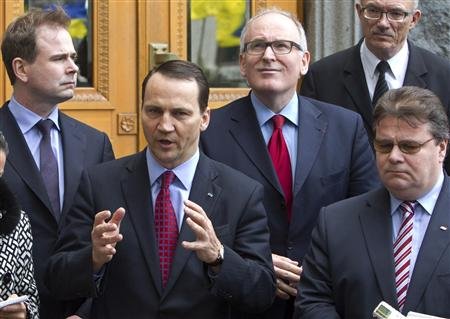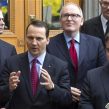
EU, Ukraine Warm to Each Other after Former Minister’s Release from Prison
Publication: Eurasia Daily Monitor Volume: 10 Issue: 79
By:

The European Union has visibly warmed to Ukraine after President Viktor Yanukovych freed from prison the former Interior Minister Yury Lutsenko, a victim of selective justice. Judging by recent statements from EU and Ukrainian officials, they now see a real chance to sign an association and free trade deal. The main stumbling blocks are Kyiv’s delays in adoption of the legislation needed to qualify and reluctance to free former Prime Minister Yulia Tymoshenko. However, apparently not all in the EU continue to insist on her release from prison, which may make it easier for Kyiv to qualify for the deal.
The EU-Ukraine Association Agreement and the Deep and Comprehensive Free Trade Agreement were technically ready for signing months ago, but the EU insisted that Ukraine first release Tymoshenko and Lutsenko and upgrade its legislation. Brussels agreed at the Ukraine-EU summit in February that the deal would be signed in November if Ukraine met its conditions by May. Even a month ago, it seemed that Kyiv was hopelessly behind schedule (see EDM, April 3). However, at that point Yanukovych may have made a geopolitical choice between rapprochement with the EU and joining the Customs Union with Russia—in favor of the EU.
On April 7, Yanukovych pardoned Lutsenko, who in February 2012 was sentenced to four years in jail for granting privileges to his former driver. Yanukovych’s advisor Andry Honcharuk did not conceal that Yanukovych did so to appease the EU, noting that an “appropriate atmosphere” was being created for the signing of the association deal (Interfax-Ukraine, April 9). Lutsenko’s release was by far not the most important of the EU’s 11, 19 or 71 conditions (according to different counts), but it was a powerful signal from Yanukovych that he was ready to set aside personal enmity for the sake of rapprochement with the EU.
The opposition has also looked increasingly prone to set aside its differences with Yanukovych. Although the three opposition factions, Fatherland, Punch (Udar) and Freedom, continued their blockade of parliament on issues unrelated to the EU through April, they helped the ruling Party of Regions to pass the anti-corruption amendments requested by the EU (UNIAN, April 18). This gave Kyiv grounds for optimism. Ukrainian Security Council Secretary Andry Klyuyev said after meeting top EU officials in Brussels on April 23–24 that Ukraine would meet all conditions for the signing of the association and free trade agreement on time. He said that of the ten laws required by the EU, Ukraine’s parliament has thus far given preliminary approval to two, passed another two, and should pass the rest by June (Interfax-Ukraine, April 25).
The EU has also made several important steps toward Ukraine. On April 18, the European Parliament (EP) recommended that the EU Council of Ministers sign a new visa facilitation agreement with Ukraine, which should make it easier for journalists, politicians, and relatives of EU citizens to obtain EU visas. On the same day, the EP endorsed the prolongation, until October, of its monitoring mission to Ukraine, which is headed by former Polish President Aleksander Kwasniewski and former EP President Pat Cox (Interfax-Ukraine, April 18).
Poles, who have always been enthusiastic about Ukraine’s integration into the EU, were especially active this April. Polish Foreign Minister Radoslaw Sikorski stated that the atmosphere in Ukraine-EU relations improved after Lutsenko’s release, and Kwasniewski told Ukrainian Prime Minister Mykola Azarov that many in Europe have stopped seeing events in Ukraine only in black and white (UNIAN, for-ua.com, April 22). He also predicted that the EU in ten years would ask Ukraine and Turkey to join (UNIAN, April 15).
Sikorski was also among the four EU foreign ministers who arrived in Kyiv on April 25 to check Ukraine’s progress. At the start of the meeting with Yanukovych, Sikorski flattered him by saying that the association deal would be the Ukrainian president’s personal historic achievement (liga.net, April 25). After the meeting, Sikorski said he was more optimistic than before, although time was running out for Ukraine to meet EU conditions (UNIAN, April 26). At the same time, the visitors were evasive on Tymoshenko. The daily Kommersant-Ukraine noted on April 26 that they did not even mention her during two press briefings. Earlier this month, the prime minister of another EU country, Andrus Ansip of Estonia, told Azarov that it would be wrong if the future of Ukraine-EU relations depended on “one card or rather one queen,” obviously referring to Tymoshenko (Ukrainska Pravda, April 11).
The EU, especially those of its members that used to be in the Soviet camp, seems more ready for concessions than a year or even a month ago. Judging by their reactions to Lutsenko’s release from prison, a pardoning of Tymoshenko would make the signing of the association deal almost certain even if Ukraine failed to meet other conditions. However, the situation with Tymoshenko is more complicated. Apart from serving a seven-year sentence for gas contracts with Russia, she is also suspected of involvement in the murder of a people’s deputy in 1996. Yanukovych said recently that it would be impossible to pardon her now as all the court hearings have not been completed (UNIAN, April 11).




